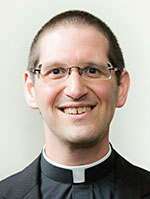Vocations Supplement
The Jubilee of Mercy and discernment
Fr. Eric M. Augenstein
 In a few weeks, the Church throughout the world will open the Jubilee Year of Mercy. In his letter announcing the jubilee year, Pope Francis spoke of what mercy is about: “With our eyes fixed on Jesus and his merciful gaze, we experience the love of the Most Holy Trinity. The mission Jesus received from the Father was that of revealing the mystery of divine love in its fullness” (“Misericordiae Vultus,” #8).
In a few weeks, the Church throughout the world will open the Jubilee Year of Mercy. In his letter announcing the jubilee year, Pope Francis spoke of what mercy is about: “With our eyes fixed on Jesus and his merciful gaze, we experience the love of the Most Holy Trinity. The mission Jesus received from the Father was that of revealing the mystery of divine love in its fullness” (“Misericordiae Vultus,” #8).
It seems to me that this understanding of mercy also speaks to what we understand vocation to be—our vocation is God’s call to each of us to become his disciple, to experience his love, and then, filled with that love, to be sent out on mission in the world.
Whether as priests, deacons, consecrated men and women, or through the sacrament of marriage, our vocation is to love as best we can and to show God’s love to others. But we can only do that after we have first fixed our eyes on Jesus “and his merciful gaze” toward us.
In fact, we might even be able to articulate a plan for discernment based on the Holy Father’s understanding of mercy. To discern is to listen for God’s voice; it begins by growing in relationship with God and experiencing his love. We might think of discernment encompassing three components:
-
Prayer—to keep “our eyes fixed on Jesus and his merciful gaze.”
-
Sacraments—through which we “experience the love of the Most Holy Trinity,” especially in the Eucharist and the sacrament of penance and reconciliation.
-
Works of mercy—sharing in Christ’s mission of “revealing the mystery of divine love in its fullness” to all we encounter, especially those most in need.
To discover one’s vocation is to grow in receiving and showing mercy; and to grow in receiving and showing mercy is a sure path to discovering one’s vocation.
Ultimately, our vocation cannot be about us—I am not a priest because I wanted to be a priest, but rather because God called me to follow him and to serve him as a priest.
And so any path of discernment should not really start with us, but with God. To put God first in prayer—to receive God’s grace in the sacraments—and to serve God in our brothers and sisters—that is both the path of mercy and the path of discernment.
In this year’s Vocations Supplement, you will read stories of people who have spent time with God, have been strengthened by the sacraments, have served their brothers and sisters, and in doing so have heard the call to service as a priest, deacon, or consecrated religious. I invite you to read their stories—stories of men and women who have walked the joint path of mercy and discernment.
And if you’re trying to figure out where you are on that path, I’d love to walk alongside you and help you keep your “eyes fixed on Jesus and his merciful gaze.” †
 In a few weeks, the Church throughout the world will open the Jubilee Year of Mercy. In his letter announcing the jubilee year, Pope Francis spoke of what mercy is about: “With our eyes fixed on Jesus and his merciful gaze, we experience the love of the Most Holy Trinity. The mission Jesus received from the Father was that of revealing the mystery of divine love in its fullness” (“Misericordiae Vultus,” #8).
In a few weeks, the Church throughout the world will open the Jubilee Year of Mercy. In his letter announcing the jubilee year, Pope Francis spoke of what mercy is about: “With our eyes fixed on Jesus and his merciful gaze, we experience the love of the Most Holy Trinity. The mission Jesus received from the Father was that of revealing the mystery of divine love in its fullness” (“Misericordiae Vultus,” #8).